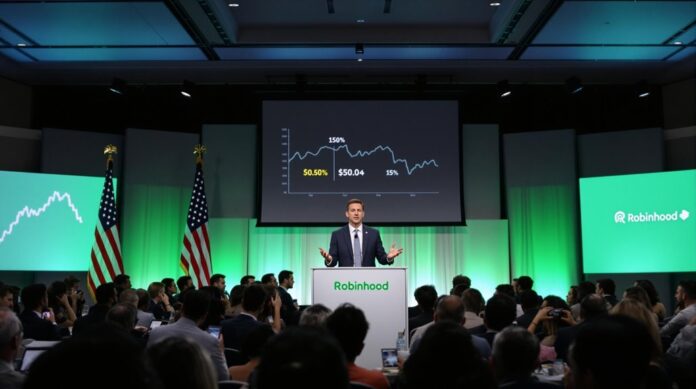Robinhood CEO Vlad Tenev warns that the US could lose its financial edge if regulators don’t provide clear rules for tokenized securities. He argues that blockchain-based assets could democratize investment in high-growth private companies, currently limited to wealthy individuals. Tenev proposes a security tokenA digital asset issued on a blockchain, often representing v registration framework and updating accredited investor criteria. With other countries advancing in tokenization, the US risks falling behind. Swift action is essential to maintain America’s leadership in global finance. Let’s explore the potential impact of this regulatory delay.
As the US grapples with maintaining its global financial dominance, Robinhood CEO Vlad Tenev has sounded the alarm on the critical need for clear tokenization regulations. In a recent op-ed, Tenev warned that without a thorough framework for blockchain-based assets, the United States risks falling behind other jurisdictions embracing financial innovation.
We’re at a crossroads in the evolution of capital markets. Tokenization, representing real-world assets on blockchainA decentralized ledger that records transactions across a ne networks, promises to revolutionize how we invest and trade. It’s not just about cryptocurrencies anymore; we’re talking about the potential to democratize access to high-growth private companies like OpenAI, SpaceX, and Stripe. These firms have increasingly shied away from public markets, limiting investment opportunities to a select group of wealthy individuals and institutions.
Tenev argues that establishing clear rules for tokenized securities can broaden investment horizons for retail investors and bridge the growing wealth gap between Wall Street insiders and Main Street Americans. He’s calling for a security token registration framework as an alternative to traditional IPOs, allowing companies to issue tokenized equity with proper disclosures and investor protections.
But it’s not just about creating new investment vehicles. The Robinhood chief is pushing for a fundamental rethink of defining accredited investors. Instead of relying solely on wealth thresholds, he suggests updating the rules to consider financial literacy. This change could open up private market investments to a much broader population, fostering a more inclusive financial ecosystem.
While the US deliberates, other financial hubs are charging ahead. The European Union, Singapore, and Abu Dhabi are already developing extensive tokenization frameworks. Even traditional finance heavyweights like BlackRock are taking notice, with CEO Larry Fink dubbing tokenized securities the “next frontier” in market evolution.
The potential benefits of embracing tokenization are substantial. We’re looking at increased liquidityThe ease with which an asset can be bought or sold without a, faster settlement times, and more efficient capital allocation. Industry analysts predict tokenization could become a multi-trillion-dollar market in the coming years, transforming how we trade bonds, funds, commodities, and real estate.
But time is of the essence. As Tenev warns, the longer the US delays providing regulatory clarity, the greater the risk of losing its leadership position in global finance. We need a balanced approach that fosters innovation while maintaining robust investor protections. This approach becomes even more crucial as the Trump administration considers imposing new tariffs on international trade, potentially disrupting global financial markets.
The ball is now in the regulators’ court. By creating clear guidelines for tokenized assets and the platforms that trade them, we can open up a new era of financial inclusion and market efficiency. It’s time for the US to embrace the future of finance and guarantee we remain at the forefront of this technological revolution. The world is tokenizing – let’s ensure America isn’t left behind. Tenev’s proposal includes a security token registration framework that could provide an alternative pathway for companies to go public, potentially revolutionizing the traditional IPO process. This push for innovation aligns with the broader trend of CEOs prioritizing growth and revenue increase despite ongoing economic challenges.



